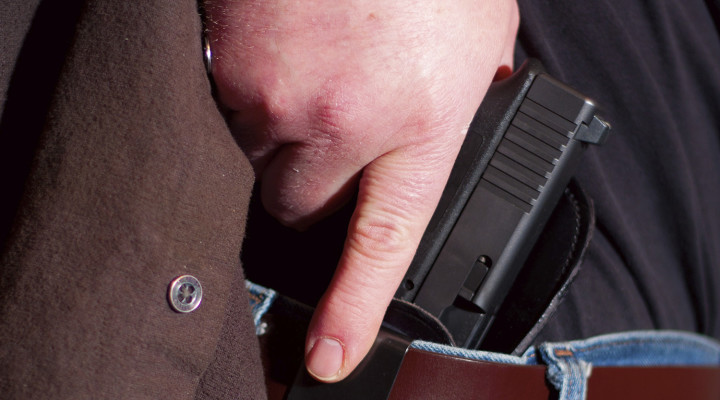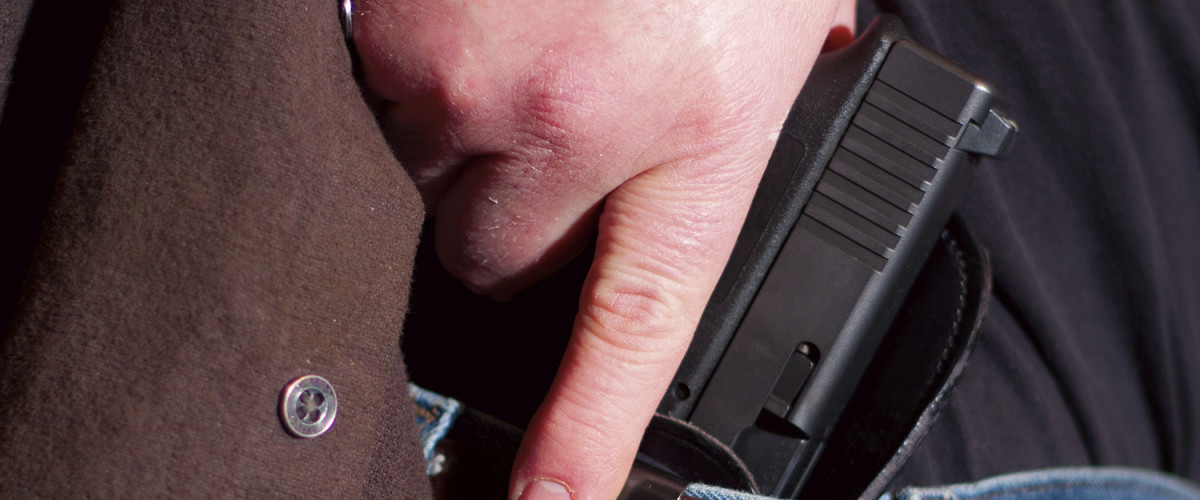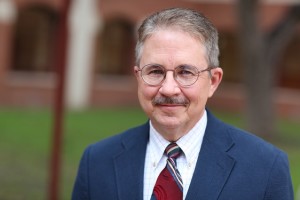The latest challenge facing some congregations is deciding whether open carry gun laws should extend to church property — including the sanctuary.
This feature first appeared on our web site in March 2016.
Jim Coston, senior pastor of Calvary Baptist Church in Waco, Texas, is still planning to use his guns.
He lives outside the city and wants to protect his goats and chickens, and firearms greatly diminish a wild predator’s return on investment when it comes to killing livestock and poultry.
The place that Coston isn’t taking his firearms is church.
Church leaders around Texas are — no surprise — under the impression that an openly displayed handgun doesn’t promote a worshipful environment.
Texas became an open carry state in January, when a law that passed last year by the state legislature went into effect. That means people who have had a license to carry certain concealed weapons, which has been allowed since the 1990s, can carry their guns out in the open.
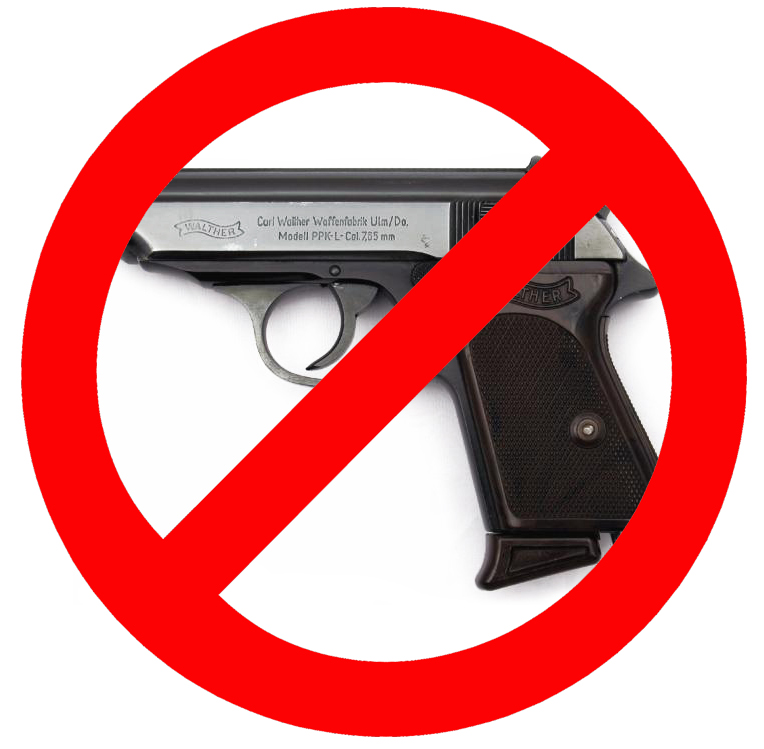 Private property owners, however, have a say in whether or not they will allow those openly carried weapons in their establishments.
Private property owners, however, have a say in whether or not they will allow those openly carried weapons in their establishments.
Now churches in the state are deciding among their options for how they want to adjust to the new rule.
“Our deacons and church council … discussed the situation in great detail and decided we would not allow any open carry in the sanctuary,” says Scott Chapman, chair of deacons at First Baptist Church in Austin, Texas.
They can’t do anything about sidewalks in and around the building, Chapman says. The law allows prohibition only inside the main building.
Chapman says he attended a seminar with almost 80 people representing 20 different churches to discuss the implications of the new law. They considered a variety of solutions. They could hand people small cards stating that the church doesn’t allow open carry or they could approach people and tell them verbally.
What First Baptist Church in Austin is opting to do is to put up a sign.
The sign must be “be displayed in a conspicuous manner clearly visible to the public,” according to resources from the Texas Department of Public Safety. They have to “appear in contrasting colors with block letters at least one inch in height; and be displayed in a conspicuous manner clearly visible to the public at each entrance to the property.”
Chapman says he was not happy about having a large sign mar the entryway to the church, but that it was preferable to putting an elderly church staff woman into situations that could potentially “get ugly.”
As for the why they wanted the ban?
“Many people thought it would be hard to be worshipful if they’re sitting in a pew next to someone with a gun exposed,” Chapman says. “It’s just not conducive to a worshipful experience.”
Tallowood Baptist Church in Houston was still in the process of making a decision in mid-January, said Larry Heslip, pastor of administration at the church. It’s taken a position against it but is still waiting for a congregational vote.
“We’re a very democratic bunch,” Heslip says.
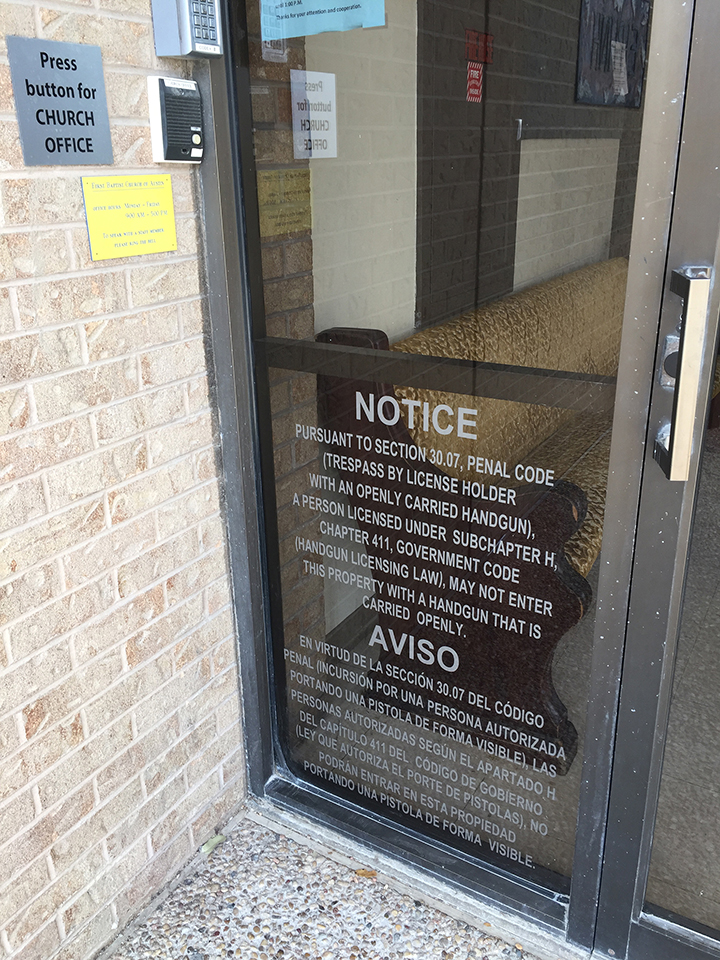
First Baptist Church of Austin has opted to post a sign on its doors to prohibit firearms in the sanctuary.
Texas had a couple of major laws at stake in the most recent legislative session. The open carry law was one.
A more conservative Senate weighed in and, with the Republican governor’s backing, an open carry bill became law.
More outcry came from a different law, however, one that lets people carry guns on college campuses. That bill’s opposition lightened a little when private — including religious — universities were allowed to opt out, which virtually all of them did.
Even before the concealed carry law, people were allowed to carry long-guns, such as rifles, openly down the street.
According to the new law, the unconcealed handguns have to be holstered whether they’re loaded or not.
Roger Olson, a professor of theology at Baylor University’s Truett Theological Seminary, says one of the core considerations is whether or not the church should choose pacifism.
In the Gospels, Jesus tells Peter to put away his sword at the Garden of Gethsemane. On the other hand, Luke 22:36 reads:
“He said to them, ‘But now if you have a purse, take it, and also a bag; and if you don’t have a sword, sell your cloak and buy one.’”
The Scripture takes place at the Last Supper in Luke, and later, verse 38 reads: “The disciples said, ‘See, Lord, here are two swords.’
“‘That’s enough!’ he replied.”
“Both sides, pacifists and non-pacifists, can defend their position from the New Testament itself,” Olson says.
Pacifism seems to have solid support in theory.
“Would Jesus carry, open or concealed? I would suspect not,” Olson says.
Pacifism comes with its own quandaries, however. Olson says he recommends people watch films like The Machine Gun Preacher, in which the main character is invited to use violence against the Lord’s Resistance Army in Uganda, which captures and brutalizes children to turn them into soldiers.
“Then the question is, does God expect us to defend the weak among us? If yes, then how?” Olson says.
In principle, he says he isn’t opposed to people carrying weapons where there is real danger. But he adds: “Better to have someone who is trained,” referring to professional law enforcement.
Baptist churches aren’t the only ones trending against allowing openly visible weapons in worship. The Catholic Diocese of El Paso, Texas, is set against open and concealed carry.
“We talk a lot about safe environment,” says Diocese Chancellor Patricia Fierro. “We felt like this was part of that. … We’re not going to allow concealed or open carry weapons inside our churches.”
She says people just feel safer “sitting next to someone who doesn’t have a gun.”
As of mid-January, the diocese was still printing signs. Some locations have general, dedicated security in their facilities already, Fierro says.
The Episcopal Diocese of Texas is not allowing firearms in its churches either.
“The Episcopal Diocese of Texas does not permit any person, including clergy, staff, students, volunteers and visitors, to carry a weapon in our churches or schools. This prohibition applies even if the person is licensed to carry a concealed weapon under Texas law,” an online resource for the diocese states. The site even has samples of the prohibition signs and cards ready for printing.
A post by the co-chancellors of the Texas Annual Conference of the United Methodist Church states: “Believing that the open carry of handguns on church property is inconsistent with an atmosphere of prayer and worship, it is the recommendation of the Conference Chancellors that oral and/or written notice be given in accordance with the statute prohibiting the ‘open carry’ of handguns in churches of the Conference. We make no recommendation regarding the prohibition of concealed handguns on church property and suggest that this be left up to individual congregations.”
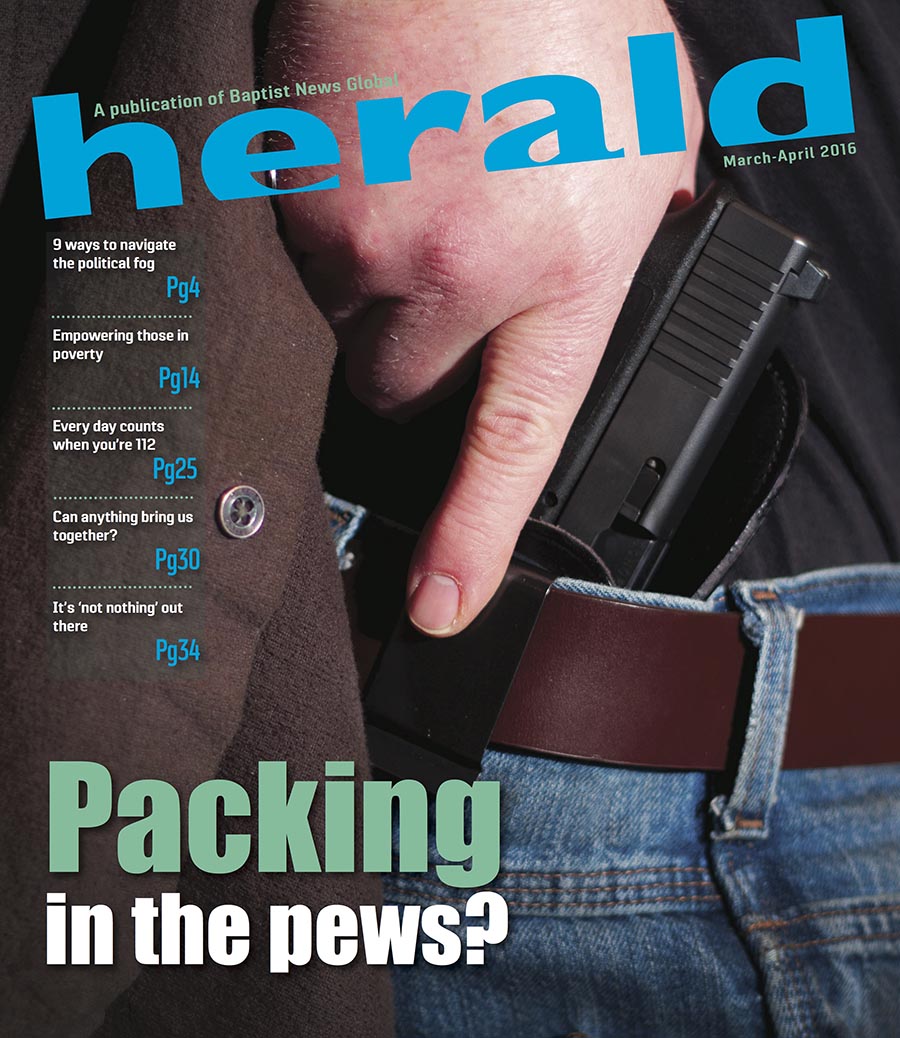 From the Herald
From the Herald
This story first appeared in Herald, the magazine for BNG Annual Fund donors. Donate now to join the Annual Fund.
Doug Dubois, executive director of the Texas State Rifle Association, which promotes gun rights, claims he hasn’t heard much concern from churches about the new law.
“We felt like concealed carry is going to be more likely the rule of thumb for most churches,” Dubois says. “The perception that a church might be a gun-free zone is really not the case anymore.”
Calvary Baptist Church in Waco went ahead and voted to prohibit bringing any kind of firearm into the church.
Waco made the news in 2015 when nine bikers were killed in a motorcycle gang shootout.
“The church has never had anything official,” Coston, the pastor, said before the decision. “We’re a house of worship. We’re seeking to follow Jesus. We would like to break the swords into ploughshares now instead of having to wait.”
Calvary Baptist has opted to have people approach staff members if they see anyone holding guns, rather than have the large sign.
“To many of us [the sign] seemed somewhat surreal,” Coston says. “I would rather people see the cross than see that sign.”
Coston says he didn’t expect there to be any problems. For 80 years, in no one’s memory has there been an issue.
But Coston adds that, even with firearms banned at the church, he would be using them himself.
“I live outside of Waco,” he said, and he will defend his goats and chickens from predators with the weapons.
“As it comes to bringing handguns to church, we’re called to live differently, and we’re trying to do that.”
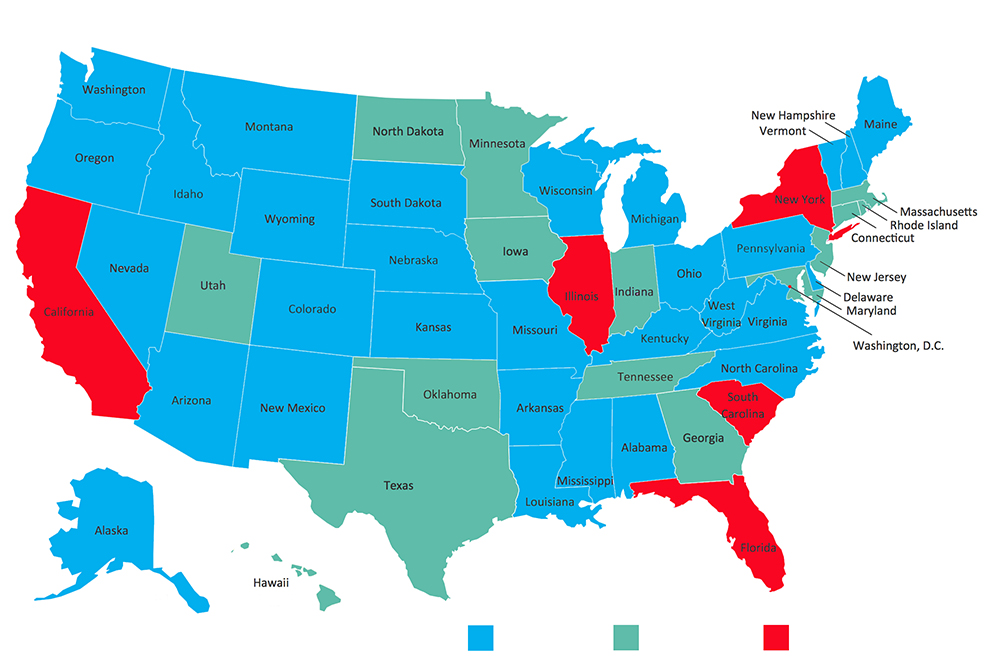 Laws on open carry vary greatly among states. More than 40 of the 50 states already allow open carry. In Nevada, people don’t need a license to carry a gun openly, but they do need a permit to carry a concealed weapon.
Laws on open carry vary greatly among states. More than 40 of the 50 states already allow open carry. In Nevada, people don’t need a license to carry a gun openly, but they do need a permit to carry a concealed weapon.
Other states allow for open carry, but they effectively are no-carry states.
Republican Texas Governor Greg Abbott said soon after his election that he supports open carry efforts.
“If open carry is good enough for Massachusetts, it’s good enough for the state of Texas,” Abbott said.
In Massachusetts, however, a person who is bothered by seeing a gun can prompt an assault charge and license removal, Jim Wallace, executive director of the Gun Owners’ Action League in the state, has told Scripps News.
In 2014, a Georgia Baptist lobbying group supported legislation in Georgia to let churches opt-in to allowing guns in churches.
At a House Public Safety and Homeland Security Committee meeting, Mike Griffin a public affairs representative for the Georgia Baptist Convention, testified in favor of allowing guns.
“The protection of innocent human life is paramount,” Griffin said. “It’s the most important protection we can have in our country. If we don’t have life, we don’t have liberty. If we don’t have liberty, we don’t have property rights. So that’s very important that we protect, and I think among law-abiding citizens as qualified in this legislation, no one would have any reason to fear having more people like that around you.”
North Carolina allows for open carry, and David Blackmon, coordinating pastor at First Baptist Church of Asheville, said his congregation hasn’t taken any positions on the matter. “We haven’t done anything,” Blackmon says. “We don’t have signs that say don’t bring weapons in. Our general culture here is that people aren’t going to walk in with a gun. We’ll probably just gently say, don’t bring that in.
“I think the harder part for churches now is deciding what to do just in general around security.”
The topic of church security heightened after the Charleston, S.C., shooting last summer, when nine people were shot and killed at Emanuel African Methodist Church in an act of racial terrorism. Open carry is illegal in South Carolina.
— This feature first appeared in the March/April 2016 issue of Herald magazine, published by Baptist News Global five times a year and distributed to donors to the Annual Fund. Bulk copies are also mailed to BNG’s Church Champion congregations.

